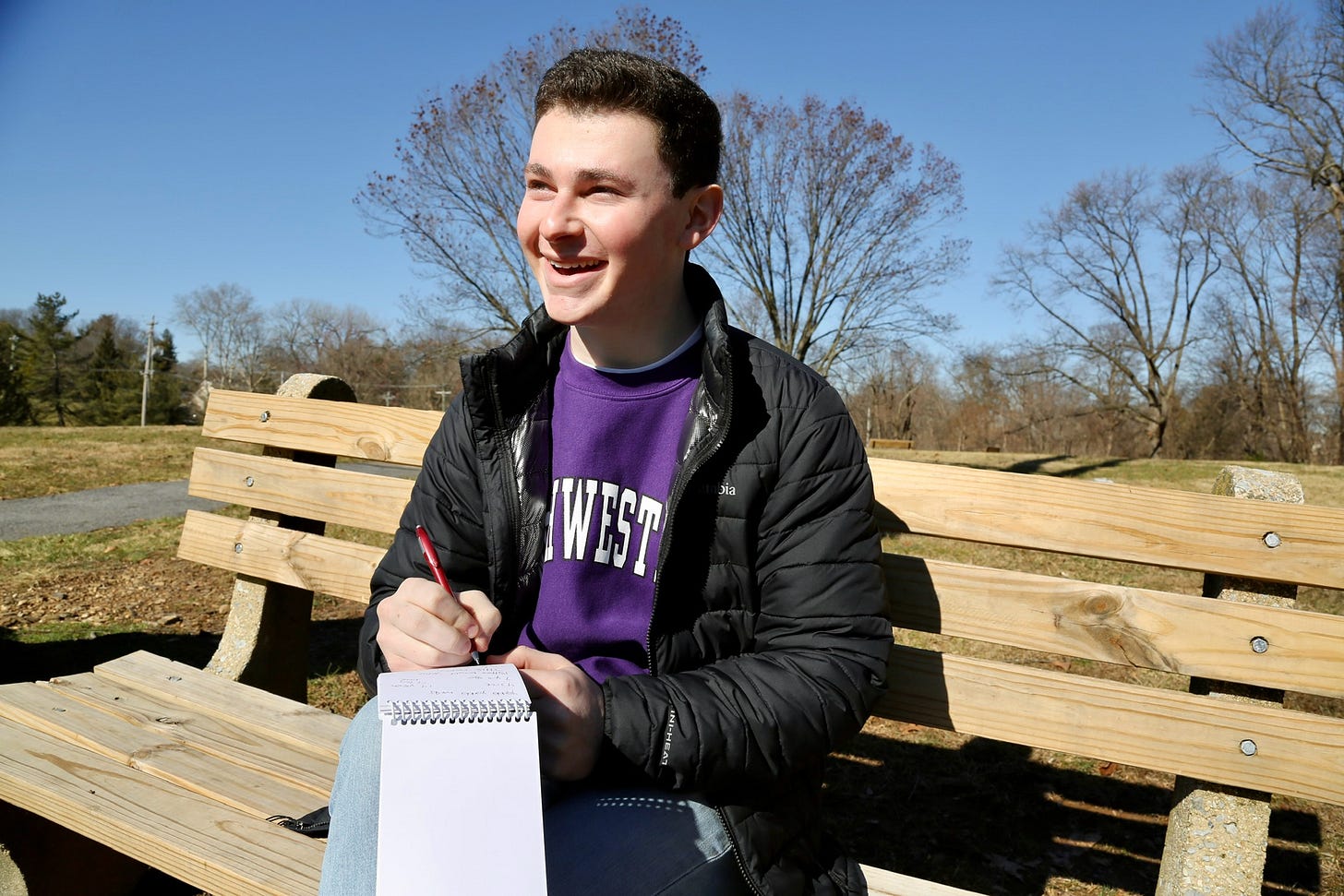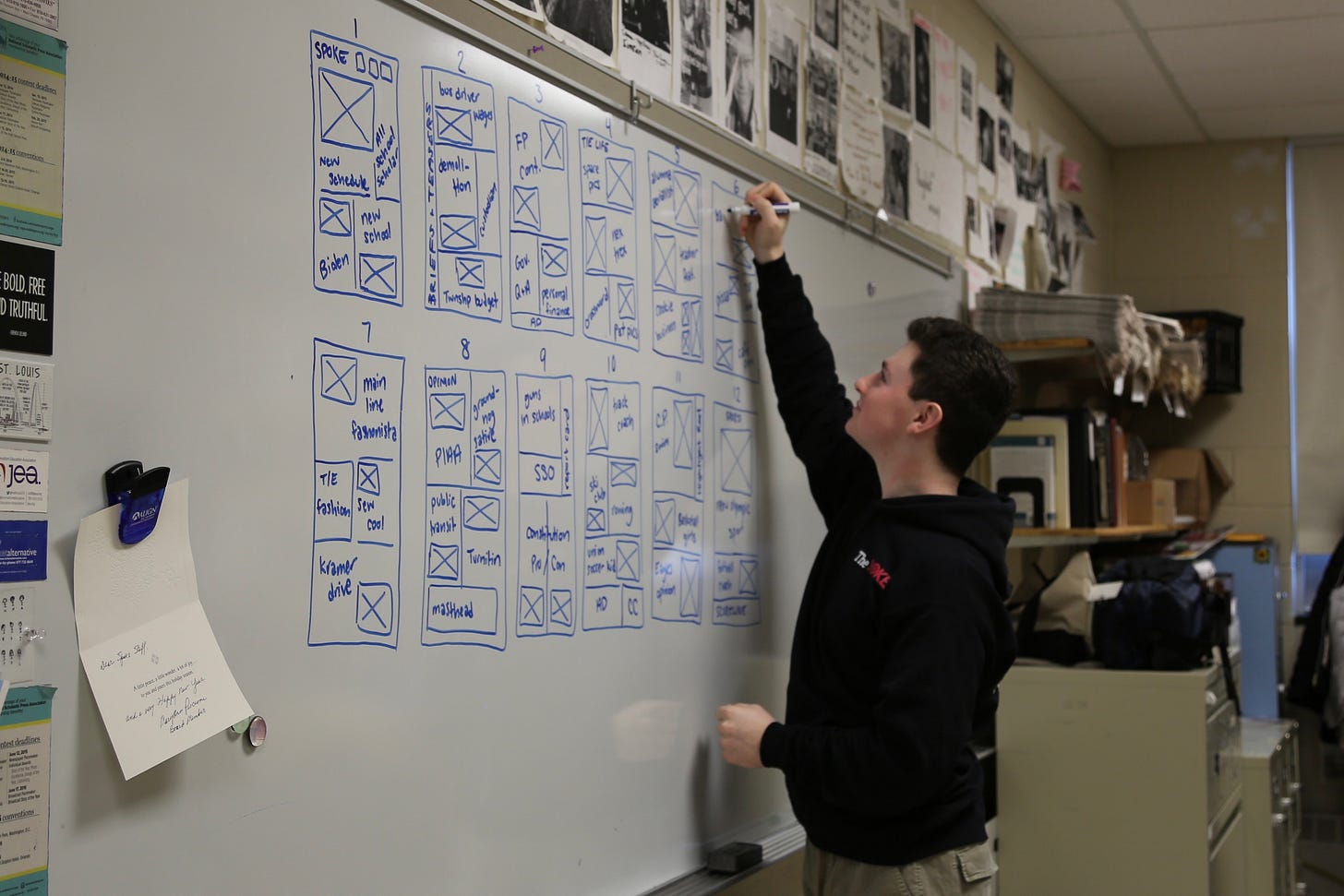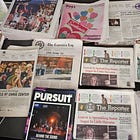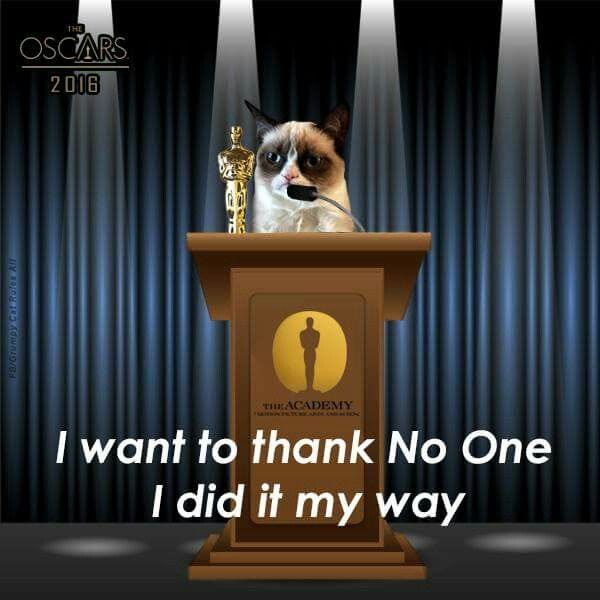From random start to journalism star
Meet Ben Shapiro, Pennsylvania high school student journalist of the year
What started as a random suggestion by an English teacher has turned into a pursuit of hard-hitting journalism.
That was the journey of Ben Shapiro, a former editor-in-chief of The Spoke at Conestoga High School in Berwyn, Pennsylvania.
From uncovering mask mandate loopholes for bus drivers during COVID to capturing live protests and controversial school events, Shapiro said he thrives on the rush of breaking news and the impact his stories can make.
He even called himself a “controversy junkie.”
“I love hearing that something’s happening and just dropping everything and going to cover it,” Shapiro said. “I love taking the stories that no one knows about and then making sure that everyone knows about them.”
Shapiro now sets his sights on Northwestern University for a journalism degree this fall.
In this Q&A, Shapiro shared how he navigated the challenges of student journalism, the importance of writing stories that matter and his drive to shine a light on the truth, no matter how controversial.
The responses have been edited for grammar, flow and concision.
Why did you join your school newspaper?
It was totally random. When I was in eighth grade and we were filling out our course selection form for freshman year, I really had no idea what it meant to be in the newspaper.
My English teacher told me I should join. So I joined with no intention of wanting to become the paper’s editor-in-chief.
The way it works in my school is it's a class and a club. It was during COVID-19. I started going to the newspaper staff meetings on Zoom. By midway through the year, I realized I loved the newspaper.
From there I just wanted to be an editor and I moved up the ranks and became editor in chief. And I loved it. I know now journalism is what I want to do going forward and that's something to go to college for.
Since it was random at first, what made you stick with The Spoke?
I don't know if there was a single thing. I think it's just like some of the stories I wrote I realized they mattered. In middle school, we had a campus newspaper and I would write like meet-the-new-teachers and like fake stuff like that.
I remember one of them was a story about bus drivers. I would take the bus to and from school during the peak of COVID (November 2020). I saw that my bus driver wasn't wearing a mask. I was like, “That's weird.” I feel like she should be wearing a mask.
I texted one of my editors, who I just became friendly with throughout the year, and we looked into it and saw that there was a really weird loophole in the rules that bus drivers didn't have to wear a mask when they were driving buses because it could impair their vision.
I started writing that story, and that was kind of a hard story, I guess, for a freshman. I had to get bus drivers to speak on the record about that, and not many bus drivers wanted to.
After that story, I realized, “Oh, wow, these stories are real.” They're not just like, “This football game happened last Friday.” Then I started writing bigger stories that had an impact in that sort of where I ticked off.
What happened after the bus drive story ran?
There probably wasn't that much that happened after that specific story in terms of me writing this and hearing people knowing and talking about the issue.
But I think that story showed me there was value in what I was writing. It also showed my editor that I could write. I would go out and do a little more of the harder stories that required me to get someone to talk and maybe get them to talk anonymously because they were scared to lose their job if they talked.
It also just sort of helped me become closer with my editors who then convinced me to apply to be an editor for my sophomore year and then move down the line like that.
You labeled yourself a “controversy junkie.” Tell me more about it.
I love the phrase “controversy junkie” just because my school (of 2,400 students) is very big, and there's always something going on in some random areas. People are always losing their minds over the smallest things. But that's what creates stories.
I remember in my sophomore year, I got one of the stories probably 10 minutes before I was getting ready to leave. I saw on Snapchat that everyone was at the school’s atrium to protest the mask mandate. I was like “Maybe I should bring my camera, why not?”
I went to the atrium and I saw a huge group of students who ended up walking out of the school. Walking out of school wasn’t like the Black Lives Matter protests or the gun violence protests — which are always coordinated with the administration. They pounded on lockers as they fully left the school building in the middle of the day.
And I was there with my camera. We published a story within an hour and a half, which is really good for student journalists. The national news cycle picked it up. I had NBC reaching out to me asking to use my photos and talking to me. That was sort of where I realized that I really love to cover “in-the-moment” stuff like that.
What's challenging about covering controversies?
A couple of different things — sometimes it's the legal side of it. I've definitely faced my fair share of legal issues with reporting and just making sure everything is correct because I don't want to get sued.
But also just knowing that The Spoke is pretty well-known and people are going to see what I'm writing. If it's something controversial that's happening at the moment, I'm like “No matter what, you will get criticized for it because people have to criticize journalists.”
Our boy's soccer team is one of our best sports teams and they won the state championship in November 2023. At the game, our student section got really rowdy. There was property damage. Students ran from cops — just a bunch of stuff that was going on — which resulted in our school being put on probation from the statewide athletic group.
When I heard about that, I wrote a story that same day. That story ended up getting 30,000 views. I don't know who those 30,000 people were, but just to know that every little comma, every little thing that you have to fact-check, people will see.
And it's important to make sure that everything is right. I guess I've gotten less scared over time with people being mean about what you’re writing.
Despite the criticism, stress, lack of sleep and all the cons, why do you still do it?
Sometimes I honestly don't know. I love the rush of it. I love hearing that something’s happening and just dropping everything thing and going to cover it. I love taking the stories that no one knows about and then making sure that everyone knows about them.
It feels so rewarding to take something big that may have been hidden or that people don't know about — like this random person experienced or lived through or whatever — and then be able to publish that and have people know about it.
I think also with a lot of similar people who enjoy that rush and that crazy time pressure. My high school paper newsroom was filled with a lot of this, similar people that I became really good friends with.
What’s one thing you wish more people knew about student journalism?
The amount of work that goes behind every story that we wrote was crazy.
A reporter would write a story. It would go through a copy editor, a section editor, the editor-in-chief or a managing editor. Then it would go to the webmaster and publish. Then to the social media manager to get up on our Instagram. If it was going to go on the print version, it would go to a layout editor and a business manager.
So many people are involved in everything and a lot of the time we're getting this done in a matter of minutes to a couple of hours.
What's next for you?
I'm going to Northwestern University to study journalism with some legal studies thrown in there.
At this point, I want to keep learning how to report. In high school, I was the editor-in-chief, the highest position. I know there’s so much more that I don’t know and so much that I still have to learn.
I’m excited to be back in that position to be a freshman and to be a baby, not knowing anything and just learning from professors who’ve worked in the industry. Hopefully, I’ll write for the campus paper.
Extra! Extra!
🏆 The Nutgraf is among the four finalists for Best Solo Newsletter from the Publisher Newsletter Awards from Media Voices!
It’s alongside newsletters from big-name publishers in other categories. The winners will be announced in London on July 23. I’m very excited! Thank you all for your support.
See the full shortlist here.
Story Spotlight:
Bay Area university encampments, student reporters, and the limits of the AP Stylebook (KALW Public Media): This distrust of mainstream media has meant that student reporters have had unique and sometimes even exclusive access to encampments. The piece includes soundbites of intense encounters the reporter faced and interviews about backlash student journalists faced for following AP Style — and how that prompted one to quit.
Featured Opportunities:
Semafor is looking for an early-career journalist to be its full-time newsroom fellow in New York.
Join WHYY for an afternoon of games and journalism for teens a simulated environmental crisis June 3.
New England journalism students and recent graduates can apply for the National Association of Hispanic Journalists' career coaching network before June 5.
The Journalism Institute is hosting a panel on copyright and libel laws journalists need to know June 7.
The Chronicle of Higher Education’s fall internship program’s deadline to apply is June 7.
FIRE’s Free Press Workshop takes place in Philadelphia June 17.
KUT News Internship Program in Texas accepts applications for its fall cohort until June 26.
Fox News Media has multiple internship openings for the fall in New York, Chicago, Washington D.C., Atlanta, Miami and more. Deadline’s July 7.
I want to hear from you: What type of stories do you want to see in The Nutgraf? Is your student publication doing something cool that you’d like to share? Reach me at nutgrafnews@substack.com. I will respond! Also, please share.








